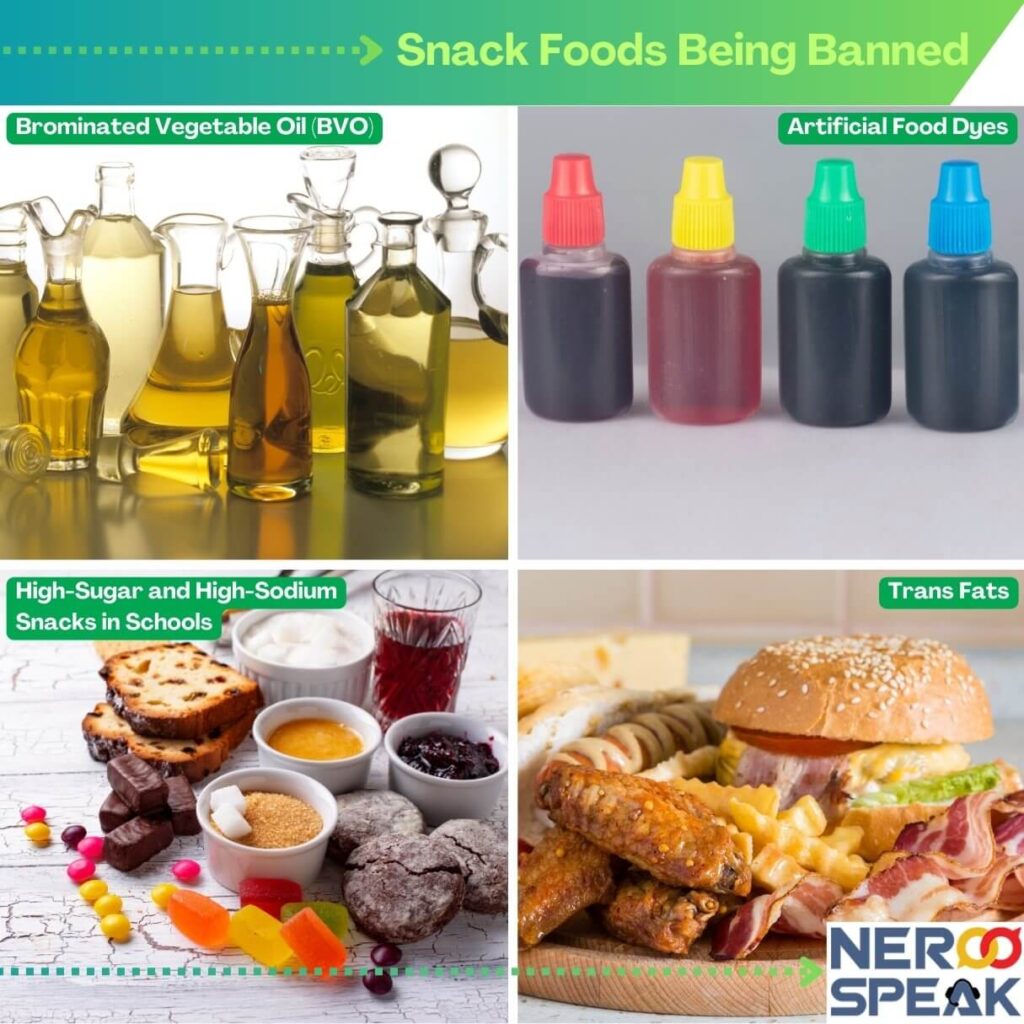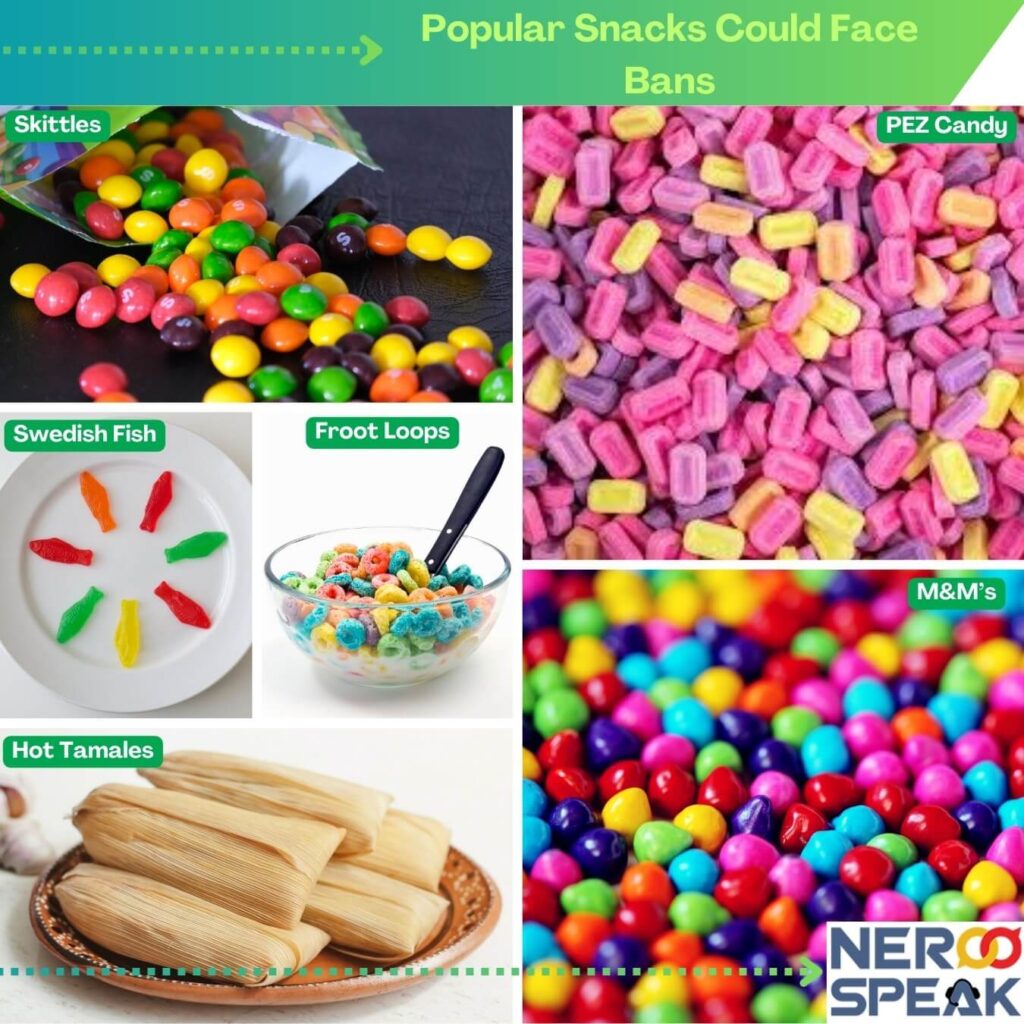Certain snack foods are facing bans or restrictions due to health concerns related to their ingredients.
Everyday Food Snacks Being Banned
Here are some notable examples of everyday food snacks facing ban:

Artificial Food Dyes
- Reason: Ingredients like Red 40, Yellow 5, and Yellow 6, found in many snacks, are linked to potential health risks such as cancer and hyperactivity in children.
- Affected Snacks: Skittles, M&M’s, Swedish Fish, Froot Loops, and Doritos.
- States Involved: California has already passed legislation, known as the “Skittles Ban,” targeting these additives, and states like New York, Pennsylvania, and Illinois are considering similar measures.
Trans Fats
- Reason: Trans fats are associated with an increased risk of heart disease.
- Affected Products: Many processed snacks, including certain types of cookies and crackers.
- Legislation: The FDA has banned partially hydrogenated oils, the primary source of artificial trans fats, since 2018.
Brominated Vegetable Oil (BVO)
- Reason: BVO is used in some sodas and sports drinks, but it has been linked to negative health effects, including potential hormone disruption.
- Affected Products: Certain flavors of Gatorade and other sports drinks.
- Status: Some states are moving towards banning products containing BVO.
High-Sugar and High-Sodium Snacks in Schools
- Reason: Efforts to combat childhood obesity and promote healthier eating habits.
- Affected Snacks: Flamin’ Hot Cheetos, sugary sodas, and various candy bars.
- Implementation: Many school districts across the U.S. have banned these items from vending machines and cafeterias.
FAQs about “Everyday Snacks Facing Ban”:
1- Can I Eat Baked Beans After Tooth Extraction?
Yes, you can eat baked beans after a tooth extraction, as they are soft and easy to chew. Ensure they are well-cooked and not too hot to avoid irritating the extraction site. Avoid adding any hard or crunchy toppings that might cause discomfort.
2- Are Food Snacks Being Banned?
Certain food snacks are being banned or facing potential bans in the United States due to health concerns related to their ingredients. These bans are primarily focused on eliminating harmful chemicals and promoting better health.
3- What 5 States Are Banning Snacks Due to Toxic Ingredients?
- California: Has implemented a ban on the manufacture, sale, and distribution of foods containing brominated vegetable oil, potassium bromate, propylparaben, and red dye 3, effective January 2027.
- New York: Consider similar legislation to prohibit these harmful additives.
- Illinois: Proposed a bill to ban the sale of food and beverages containing brominated vegetable oil, potassium bromate, propylparaben, and red dye 3.
- Missouri is also considering a ban on the same additives as California.
- New Jersey: Looking to follow California’s lead with similar restrictions.
4- What Popular Snacks Could Face Bans?
Several popular snacks could face bans due to the presence of harmful ingredients:
- Skittles: Contains artificial colors like red dye 3.
- M&M’s: Also contains artificial dyes that are being scrutinized.
- Swedish Fish: Includes controversial food dyes.
- Froot Loops: Contains yellow dye 6, linked to potential health risks.
- Hot Tamales: Includes yellow dye 6.
- PEZ Candy: Contains multiple artificial dyes.

5- Are Cheetos Facing a Ban?
Flamin’ Hot Cheetos, in particular, have been banned in some school districts across states like California, New Mexico, and Illinois due to their lack of nutritional value and potential to cause disruptions. However, they are not currently facing a nationwide ban but could be impacted by future legislation targeting food additives.
6- What snacks are being banned in 2024?
While snacks are usually not banned completely, some ingredients in snacks are getting more rules and limits. Starting in 2024:
- Trans fats: Many places are working to ban trans fats, which are oils that have been changed by adding hydrogen. This is because of health worries. The FDA is trying to take these fats out of the food supply, but local governments might have their own rules about them.
- Artificial food colorings: Some places, especially in Europe, are looking to ban or limit food dyes like Red 40 and Yellow 5 often found in snacks. These dyes are thought to cause behavior issues, especially in kids.
- High Fructose Corn Syrup (HFCS): It’s not likely that HFCS will be banned all the way, but many people are concerned about how much is being used. Some states might start to control products that have a lot of HFCS in them.
Note: In 2024, no specific snacks are “banned.” However, foods that have certain ingredients might have stricter rules in some states.
7- Are states banning snack foods?
No, states are not stopping all snack foods. But, states can set rules about some ingredients or how snack foods are sold. For example:
California has made laws that control the use of some food additives, like potassium bromate, which is in some baked goods. They may add more rules about food ingredients soon.
A few states are looking at rules to limit junk food ads aimed at kids, especially in schools. This could change how available certain snacks are. In short, snack foods are not banned completely. However, some ingredients or marketing methods might have limits on them.
8- Are states going to ban Oreos?
There is no sign that Oreos will be banned in any state in 2024. However, because of the ingredients in Oreos, like high-fructose corn syrup, artificial colors, and palm oil, some states might control these parts later. This could happen as part of larger plans to cut back on processed foods. For example:
- California: This state has been a leader in controlling food products, especially those with some additives or unhealthy fats. Banning Oreos is unlikely, but they may see stricter rules about labeling and what is in them.
- New York and other states have made laws to lower the use of sugar with sugar taxes or limits on sweet snacks in public places.
- Oreos are not likely to get banned. However, rules about unhealthy ingredients could change how easy it is to find them in some stores or schools.
9- What states are banning food additives?
Some states have made or are looking at laws to stop or limit some food additives in 2024.
- California: California is a top state for food safety rules. It has established laws to limit or ban chemicals like potassium bromate (used in bread), BPA (a common plastic), and some artificial food colors. The state requires food labels to warn about harmful additives.
- New York: New York works hard to control food ingredients. It has added a soda tax and is looking at new rules for food additives linked to health issues like weight gain and diabetes.
- Hawaii: Hawaii has suggested new laws to limit harmful additives. These include ingredients linked to weight gain in kids and behavior problems, such as artificial dyes and preservatives.
- Maine: In 2023, Maine passed a law banning specific toxic food additives, including some preservatives found in many processed foods.
These states want to limit or ban food additives, which are linked to bad health effects, especially in children. These additives include artificial colors, preservatives, and chemicals like BPA.
Why wait? Explore insightful articles on our website NerooSpeak!

Ali Mohammad is a SEO Specialist, Content Writer, and WEB Developer with over 4 years of experience in WEB. He has a strong background in Content Writing gained through SEO Companies. He holds a Master Degree in Communications Engineering from Tishreen University and is a certified professional. Ali is passionate about Business and Engineering and enjoys helping readers by sharing his knowledge.
I like the valuable info you provide in your articles. I’ll bookmark your blog and check again here frequently. I am quite sure I will learn lots of new stuff right here! Good luck for the next!